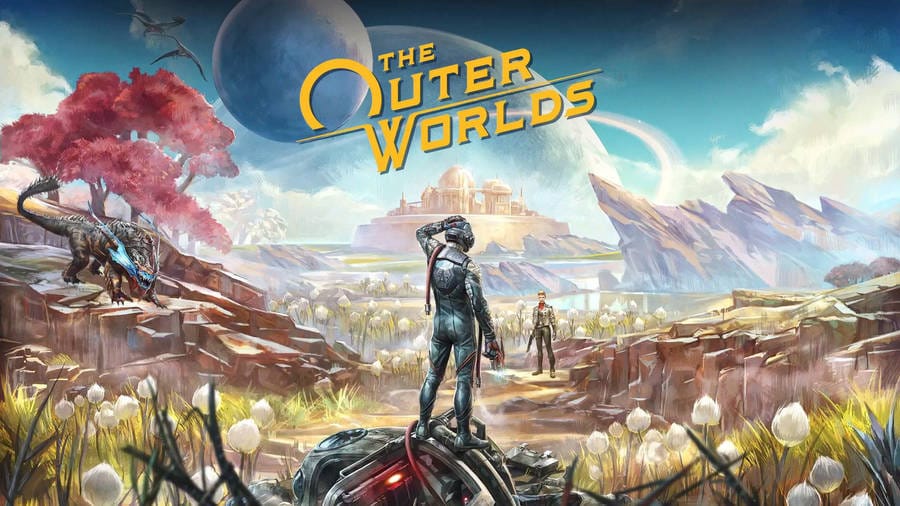In my last review for Fallout: New Vegas, I expressed doubt and questioned where my enjoyment of the game came from.
Was it forced? Did watching H-Bomberguy's video spoil the game for me? Is this a good introduction for a column a second game review in a row?
In this order - no, yes, maybe.
From the outset, I knew very little about The Outer Worlds. And after my experience with Fallout, I wasn't in a hurry to dig into reviews for the game until after my playthrough.
I did watch the Jim Sterling video, which drew direct comparisons between The Outer Worlds and Fallout 76, as a way to shit all over Bethesda. But I knew from prior experience, the video would be vague enough that it wouldn't disclose anything of use about the game, other than "Game good, Bethesda abysmal."
I knew the experience was going to be more polished. For a starters, there's no guide to turning The Outer Worlds into a cruise missile with mods to make it work kind-of properly. And Obsidian was forced at gunpoint to fit an RPG in 18 months of development time.
But I wasn't prepared for the level of attention to detail, visual fidelity, and gameplay crunch. The Outer Worlds flexes its muscle from start, to finish, and is a joy to behold.

The whole game runs at a buttery smooth 144 frames a second. The characters, environments and enemy designs are all polished to a mirror sheen. It is a seriously pretty game.
To the game's credit, and the first thing that it does way better than New Vegas, is making the world and population centres feel alive. Yes, they're dingy and dirty prefab hubs with desperate people, but they don't feel empty and miserable. It helps build a sense of place that sticks with you.

Taverns are full of patrons. Places of work - such as the cannery in Edgewater - are full of menial labourers. As you walk the streets, you overhear the chatter of the civilians, as they describe their trials and tribulations. And as you move the story forward, the world reacts to your deeds - be they good, or evil.
After watching the opening cinematic, I was presented with a brief character creation sequence. Learning my lessons from New Vegas, I created a science-y diplomat type guy, that would be capable of talking first, shooting later.

And, as predicted, I never stopped being able to talk, hack and negotiate my way out of trouble. In fact, I allocated a grand total of two points into combat, and never felt any pressure to skill them up at all.
In fact, because the weapons in the game don't have their offensive output boosted, there's almost no point in allocating points in them at all. You can increase a weapon's level with money, and equip mods that change the type of the weapon to something better.
In fact, were it not for a pretty significant fuckup right at the end of the game, I would've been able to use all my soft skills right at the end of the game, too - although the final boss wasn't difficult.
Here's where things get interesting.
Let me be very clear.
The writing in Outer Worlds is fantastic. Top shelf. Not knowing anything about the game, I let the developers lead me by the hand, and show me their carefully crafted twists and turns.
I loved it. I was drawn in and invested in the story the game wanted to tell, and the plight of the characters within it.

It is certainly the case that The Outer Worlds is certainly far less morally grey than New Vegas, though. That's not a bad thing, either - it's just different.
The corporations are bad. Yes, they have something to say, but it's nothing that makes you think more than once about their motivations. There's no double take like you might've been given by the developers for Caesar's Legion, or Mr. House.
There is only white collar scum that have mismanaged the place into the ground, and whose only plan to save the colony is shit. And you know it's shit, because before they tell you about the plan, one of the characters tries to convince you to commit genocide.

I am happy to chalk up the comparative lack of depth in the Outer Worlds to the fact that it is an entirely new IP, and doesn't have two of the best role-playing games of all time to draw inspiration from.

But, there's less here.
As just one example, there's the game's companion system.
There are six in all, with storylines fleshed out over the course of the game. They'll give you quests, which reveal more about them. And by "quests", I mean one or two quests that involve Star Trekking across the universe exactly twice, sometimes shooting some dudes, sometimes not, followed by dialogue and a bonus perk.
And, well, none of them are particularly interesting.
It's not a deal breaker by any stretch of the imagination. And I like that the game gives you enough room to spend time with all of them. The skill bonuses they give are very useful, too - especially at the end of the game when the checks start getting wild.
But, coming from New Vegas where my companion had a complex origin story and a memorable payoff? There's no contest.
And it seemed the longer I played, the game presented me with few ethical dilemmas, and moved towards a much more binary presentation of the world.
The game's opening area presents you with an impossible choice, and two adversarial factions that make compelling arguments for their survival.
That was the first and last time that happened. Later on, the game builds toward a similarly impossible decision. But, at the last moment, pulls an awkward handbrake turn, and gives you a clear out to make whichever decision you want - or, to make both factions happy using your soft skills.
The problem with this, is that the game initially tells you "heads up, you will be presented with moral dilemmas that don't have a right answer." And then never makes good on that promise.

And that first moral dilemma is so juicy. It's a genuinely hard question, that ends with you hurting people, even if you have good intentions. I thought about that original storyline often during the playthrough, contemplating on my decision.
And it never happened again.
Another lowlight included a conversation, ending in a gunfight, which turned an entire area hostile against me. At no point did the game warn me "hey, dumbass, you're about to murder $IMPORTANTCHARACTER, you might want to re-think your choices."
In fact, I consulted the internet (tm) after my playthrough, and apparently you're supposed to leave that quest half done. Go figure.
By contrast, New Vegas is very clear about what will and won't happen if you opt for a particular course of action. If you'd like to take control of the Strip on behalf of Yes Man (or even Mr. House), the NCR and Legion will turn on you - and the game makes that quite clear.
But all of this back and forth has convinced me - yes, I enjoyed Fallout: New Vegas. Because despite all of these flaws, I adored The Outer Worlds.
Because, much like Persona 5 is a confluence of visuals, gameplay and story - so too is the Outer Worlds. The beautiful world design, crunchy gameplay and engaging story all come together to make a great, but not perfect, modern tribute to a (near perfect) game.
And maybe, just maybe, you'll catch me playing The Outer Worlds 2. We'll have to see.

Catch you next time,
Vulkan
Critical Information Summary:
Review Platform: PC
Developer: Obsidian Entertainment
Publisher: Private Division
Cost (At Time of Publish): $45
Did you like this article? Did you hate it? Go over and keep the discussion going on the official Vulkan's Corner facebook page! - whilst you're at it, leave a like!

